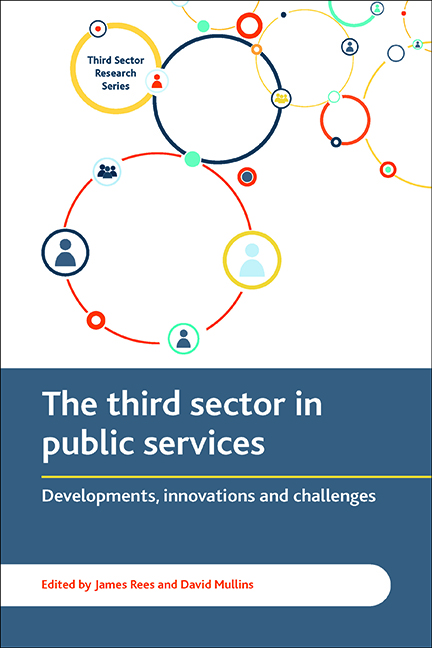Book contents
- Frontmatter
- Contents
- List of tables, figures and boxes
- Series editor’s foreword
- Notes on contributors
- one The third sector delivering public services: setting out the terrain
- Part One Policy, politics and organisations
- Part Two Cross-cutting issue for third sector service delivery
- Part Three Service delivery in key policy fields
- Index
five - Spinning with substance? The creation of new third sector organisations from public services
Published online by Cambridge University Press: 05 April 2022
- Frontmatter
- Contents
- List of tables, figures and boxes
- Series editor’s foreword
- Notes on contributors
- one The third sector delivering public services: setting out the terrain
- Part One Policy, politics and organisations
- Part Two Cross-cutting issue for third sector service delivery
- Part Three Service delivery in key policy fields
- Index
Summary
Introduction
A key theme in this book has been the impact of the changing relationship between the third and public sectors and the consequences of greater reliance on public sector funding for some organisations. Inherent within many of these debates is the notion that third sector organisations begin as autonomous entities that have been developed through voluntary endeavours of individuals or communities. However, in recent policy in England there has been growing interest in spinning out of services from the public sector to situate them in new third sector organisations. On a national level, such moves have been most strikingly encouraged through the Right to Request and the mutuals programmes. Supporters see spin-outs as hybrid organisations in which the public sector workforce are freed from constricting bureaucracy, and allowed to use new business opportunities to innovate and grow to the benefit of their users, communities and staff. For the Labour government, such developments were clearly situated in their interest in social enterprise, whereas the Coalition places a greater emphasis on mutuality and staff ownership. In reality though, there is little to split these governmental visions of spin-outs, with much more evolution than revolution between the two policy periods. Detractors claim that such policies are nothing more than Trojan horses for privatisation, which aim to weaken the role of state rather than strengthen the role of the third sector, that there is no solid evidence that such new models will lead to the expected innovation and efficiency, and that they provide unwelcome competition for existing third sector organisations in a time of public sector austerity (for example, Lister, 2008; Leys and Player, 2011; Unison, 2011; Godden 2012).
Whatever one's perspective on the underlying motivation is, spin-outs raise important questions regarding the relationship between third and public sectors. In this chapter we draw upon the research by authors and colleagues in relation to spin-out policies. This includes the rollout and uptake of Right to Request within the NHS, the national evaluation of the Social Enterprise Investment Fund that fuelled the NHS spin-out process, and research studies on innovation within spinouts. Where relevant, we also draw upon work by other academics in relation to these and related policy developments.
- Type
- Chapter
- Information
- The Third Sector Delivering Public ServicesDevelopments, Innovations and Challenges, pp. 87 - 106Publisher: Bristol University PressPrint publication year: 2016



